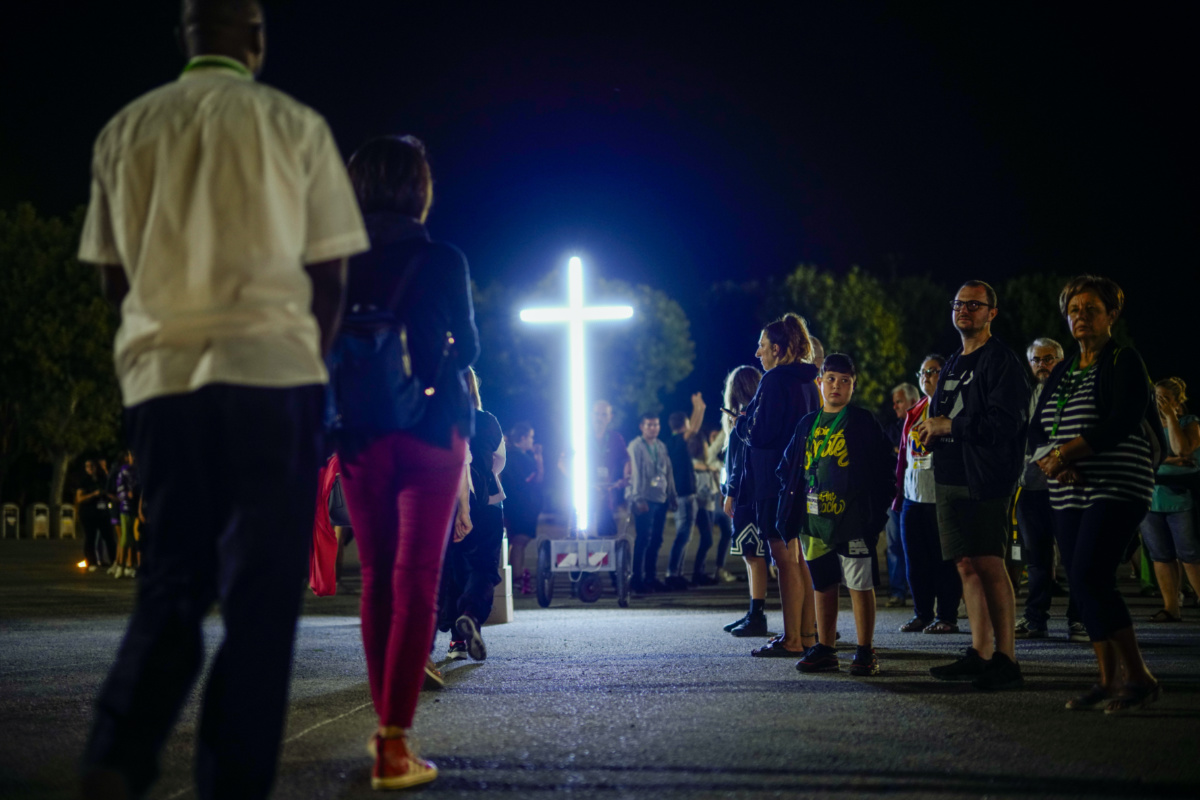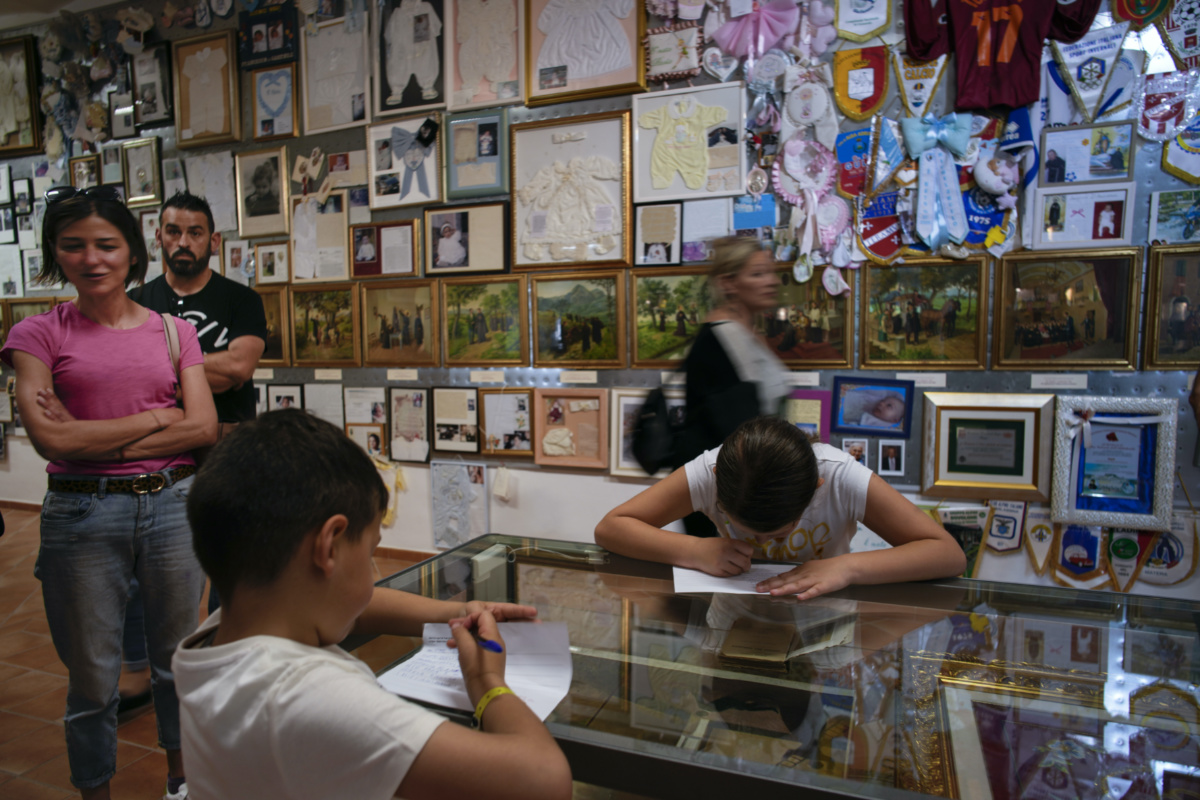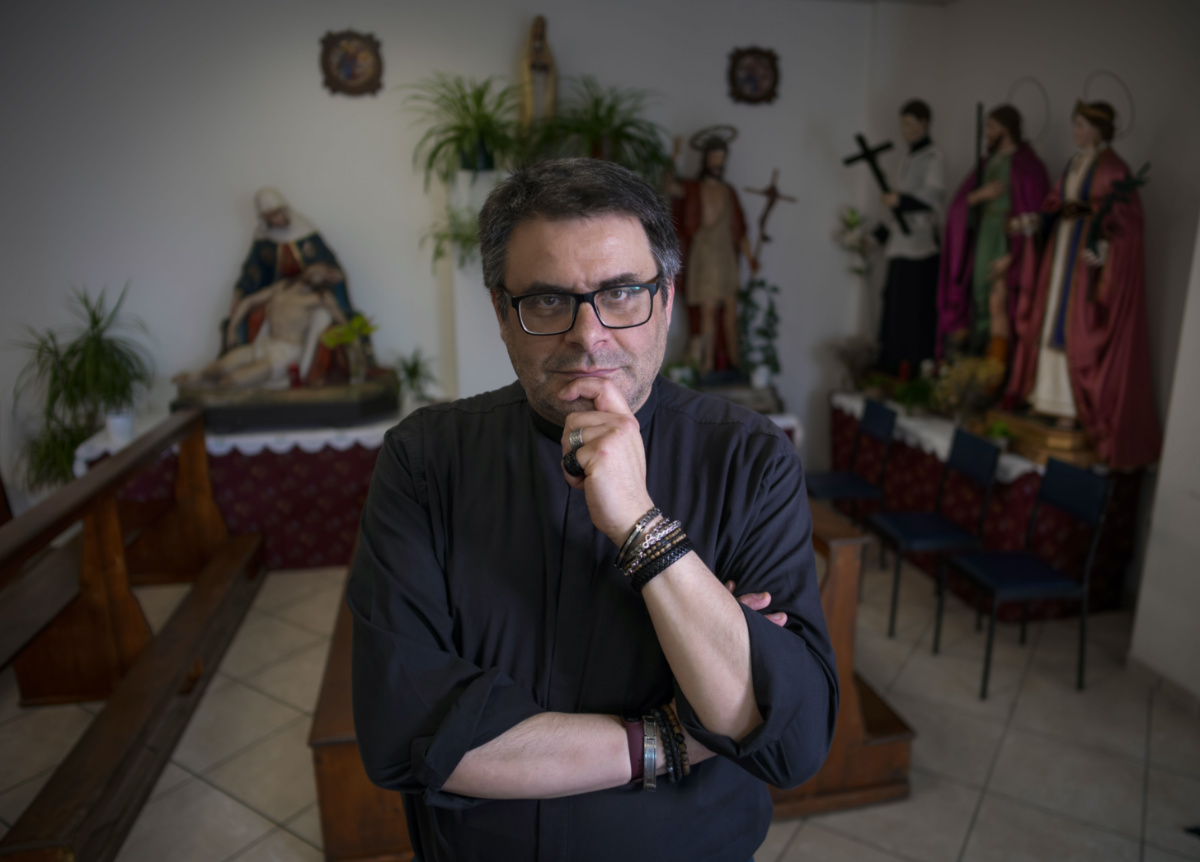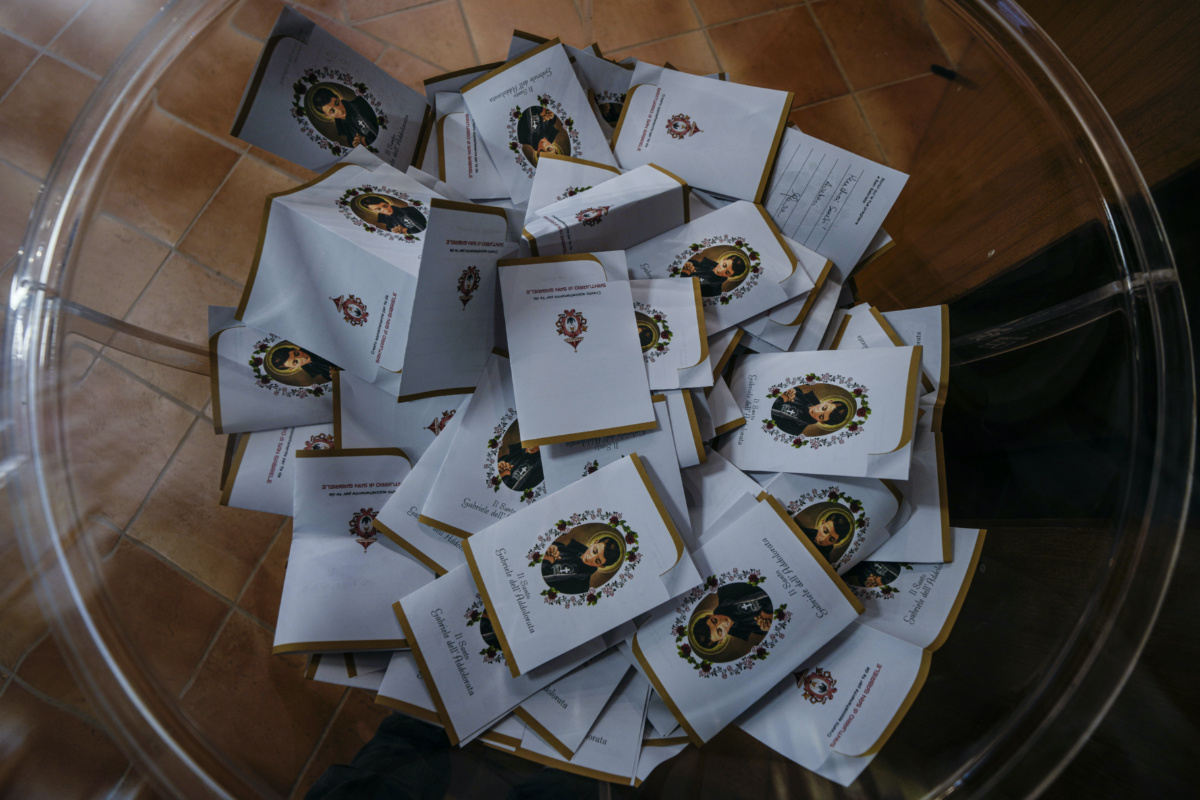
GIOVANNA DELL’ORTO, of Associated Press, reports from Italy…
Isola del Gran Sasso, Italy
AP
Two children scribbled petitions to St Gabriele dell’Addolorata in the sanctuary where the young saint is venerated in this central Italian mountain village. Andrea, six, asked for blessings for his family and pets, while Sofia, nine, offered thanksgiving for winning a dance competition.
Their parents bring them here often, and consider themselves better Catholics than many – but they rarely if ever go to Mass and don’t receive Communion because they are not married, thus shunning two sacraments the Catholic Church considers foundational.
“I practice where I want,” said the mother, Carmela Forino. “One has to believe in something, right? You do what you feel in your heart. You can’t require me to go to Mass on Sundays.”

Carmela Forino, left, with her partner Stefano Tempestilli and children Andrea, six, third from left, and Sofia, nine, at the San Gabriele Dell’Addolorata sanctuary in Isola del Gran Sasso, near Teramo in central Italy, Sunday, on 4th June, 2023. The two children scribbled petitions to St Gabriele dell’Addolorata in the vast sanctuary where the young saint is venerated in this central Italian mountain village. Andrea asked for blessings for his family and pets, while Sofia offered thanksgiving for winning an early summer dance competition. PICTURE: AP Photo/Domenico Stinellis.
That’s the paradox in this country long considered the cradle of the Catholic faith. Elsewhere in deeply secular Western Europe, the “nones” – those rejecting organised religion – are growing fast.
In Italy, however, most retain a nominal affiliation, steeped in tradition but with little adherence to doctrine or practice. According to the latest Pew Research Center survey, 78 per cent of Italians profess themselves to be Catholic – but only 19 per cent attend services at least once a week while 31 per cent never do, per data by the Italian statistics agency, ISTAT.

Rev Giovanni Mandozzi, parish priest in Isola del Gran Sasso near Teramo in central Italy poses for portraits on Saturday, 3rd June, 2023. “I tell them, ‘I do Mass in under 40 minutes, you can leave your pasta sauce on the stove, and it won’t even stick to the bottom of the pot.’” PICTURE: AP Photo/Domenico Stinellis.
“‘I don’t have time, I don’t feel like it’ – there isn’t a real reason. That’s what’s scary.”
– Rev Giovanni Mandozzi, a parish priest in Isola del Gran Sasso
The COVID-19 pandemic pruned even more tepid Catholics, accelerating a loss in faith that started at least a generation ago, said Franco Garelli, a University of Turin sociology professor.
“‘I don’t have time, I don’t feel like it’ – there isn’t a real reason. That’s what’s scary,” said Rev Giovanni Mandozzi, parish priest in the sanctuary’s village, Isola. “I tell them, ‘I do Mass in under 40 minutes, you can leave your pasta sauce on the stove, and it won’t even stick to the bottom of the pot.’”
On an early summer Saturday evening, he celebrated Mass with fewer than two dozen elderly parishioners in a former butcher shop, because Isola’s church was damaged by earthquakes that have devastated the region of Abruzzo since 2009.
Nearby, several close friends in their 20s were enjoying drinks and appetisers outside a bar.
They described growing up attending Mass and catechism, only to stop after receiving the sacrament of confirmation – or “getting rid of it,” as one put it – in their early teens.
“It would have become just a routine,” said Agostino Tatulli, 24, a college and music conservatory student who sometimes still goes to church with his mother. “I’d say I’m spiritual. I don’t know if God exists.”
From his childhood serving as an altar boy, he misses “the sense of community that formed on Sunday mornings.” Tatulli still finds some of that in his gigs with a marching band for the popular feasts of patron saints — whose celebrations are crucial to fellow band member Federico Ferri.
“I’m a Catholic believer in the saints, not in the church,” Ferri added. He goes only occasionally to Mass, but often to the sanctuary.

The faithful attend a ‘Via Crucis’ (Way of the Cross) at the St Gabriele dell’Addolorata sanctuary in Isola del Gran Sasso near Teramo in central Italy on Friday, 29th July, 2023. In Italy, centuries-old churches dot the landscape, sanctuaries and processions draw crowds, and nearly 80 per cent of the population profess themselves Catholic. But to the majority, it’s an affiliation in name and tradition, with little adherence to doctrine or practice. PICTURE: AP Photo/Domenico Stinellis
Thousands of teens continue to flock each spring to San Gabriele sanctuary for the “blessing of the pens” with which high school seniors will take final exams — a tradition that felt lovely but “more superstitious than religious” to former pilgrim Michela Vignola.
“Now I don’t even think about it,” she said, referring to the faith she abandoned in her teens. “It’s taken for granted that you’re a believer, but you don’t participate.”
A hairdresser, Vignola coifs a lot of bridal parties, most still headed to church – the choice of about 60 per cent of Italians getting married for the first time, making the sacrament just a bit less popular than a church funeral, favored by 70 per cent of Italians, according to Garelli’s research.
In a nearby village, fifth-generation funeral home director Antonio Ruggieri has added wake rooms for followers of non-Christian religions and is building a “neutral” one with no religious symbols. But almost all his funerals are in a church.
“It’s a sort of redemption, even if you barely believe in it,” he said.
For many priests, that attitude means that a social point of no return might have been reached. How to respond is a major challenge for clergy already struggling with a significant drop in vocations that leaves many with barely the time to celebrate Masses in multiple villages under their care.
Those who participate actively do so now out of a deliberate choice and not because the church, and its social and cultural programs for youth, are the only game in town as they used to be.
Such believers should be focused on as if they were the last of the species on Noah’s Ark, joked Rev Bernardino Giordano, the vicar general of the pontifical delegation to Loreto, an even more popular sanctuary less than 160 kilometres away.
In a previous assignment in northern Italy, he dealt with the other extreme – the few who asked his diocese to be “sbattezzati”, or de-baptised, which really meant expunged from the parish baptism record since a sacrament like baptism can’t be undone.

Petitions to St Gabriele are left in a bowl at St Gabriele dell’Addolorata sanctuary in Isola del Gran Sasso near Teramo in central Italy on Sunday, 18th June, 2023. PICTURE: AP Photo/Domenico Stinellis.
But the majority remain in a grey area – drawn not by sacraments but by the church’s social justice work.
“It’s very reductionist to have as the only measure those who practice [the faith]. The Holy Spirit is at work everywhere, it doesn’t belong only to Catholics,” said Archbishop Erio Castellucci, the vice president of the Italian bishops’ conference.
That might appeal to Federica Nobile, 33, who defines herself as “Catholic but not too much.” Raised in a very observant family, she felt she needed to exorcise “the absurd fear of hell” she grew up with.
“I tried to get above the concept of good vs evil. Looking for nuances allows me to live a lot better,” said the branding strategist and fiction author.
We rely on our readers to fund Sight's work - become a financial supporter today!
For more information, head to our Subscriber's page.
In the provincial capital of Teramo, when Marco Palareti asked the middle-school students in his optional religion class to rank values, family and freedom came first – and faith dead last.
“Kids’ attitude has changed, because in earlier times almost all of them had a life in the parish, while today many don’t go or go only for the sacraments” of First Communion and confirmation, added Palareti, who has taught religion for 36 years.
It’s an attitude that Pietro di Bartolomeo remembers well. When he was a teen bullied because of his family’s strong faith, he “saw God as a loser.” Now a 45-year-old father of five, he runs a Bible group for teens in Teramo.
He believes the church needs to evangelise more – or it’s doomed to irrelevance.
“The old ladies sooner or later will go to the Creator, and that’s where the cycle stops,” he said.






